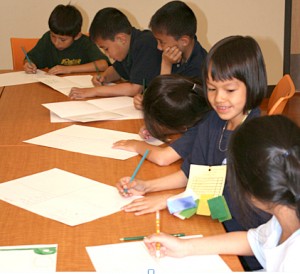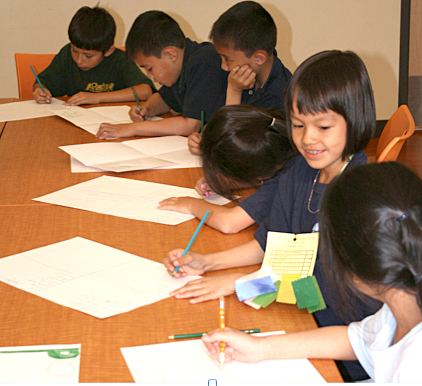
Founded in 1991 by community representatives and faculty members in DU’s Graduate School of Social Work, the Bridge Project aims at developing a program to reduce educational barriers, increase educational opportunities and improve learning outcomes for children and youth living in Denver. Their mission is to provide educational opportunities for children living in Denver’s public housing neighborhoods so they can graduate from high school and attend college or learn a trade.
“Maybe I’m not having much of an impact on the problem as a whole, but I am making a difference in the life of my student,” said Bridge Project volunteer Michaela Diamond, an accounting major from Palmer Lake who started volunteering as a tutor last year for the Pioneer Leadership program but has continued to volunteer after her requirement was over. “If practicing reading with me just once a week gives [my student] the extra push in his literacy skills or helps him to love learning just a little bit more, it is all worth it,” said Diamond.
The Bridge Project uses three primary program components that are intended for youth, children and parents: the afterschool, summer and scholarship programs. The after school program is open to people ages three to 18 and they offer one-to-one tutoring, homework help, technology education, literacy programs and family support.
Lynne Wilky, the Development Director, has been working at the Bridge Project for eight years and has seen the Bridge Project grow since it opened 21 years ago.
“We are a literacy-based program,” said Wilky. “The children come to the locations after school. The volunteers work one-on-one with the kids because the kids are anywhere between one, two or three years behind. We have 12 interns from the Graduate School of Social Work. They come and help with our programming every year. We couldn’t run without these volunteers.”
The commitment for Bridge Project volunteers is an hour once a week. Before starting, volunteers get to suggest what age they want to be placed with and then are placed with a child and the location. Typically, tutors will start out helping with reading and homework or sometimes they may just drop in and help solely with homework.
“[The student I help] is so bright, incredibly well-behaved and intellectually curious,” said Diamond. “We talk about each other’s lives. He comes from a huge Muslim family, and it’s been really cool to hear about their traditions and celebrations. He loves football, so we always talk about the Broncos game from the past week.”
The Bridge Project is currently tutoring over 600 children in these six locations. Four out of the six site locations are in Denver’s public housing neighborhoods. Here, children and volunteers can work together in an educational and safe environment. There is even a healthcare manager that helps with health and dental issues and helps provide Medicaid, according to Wilky.
“There are a lot of these environments where there are gangs and drugs. Most of these families live off of $8,800 a year,” said Wilky. “There’s a lot going on in these neighborhoods. The majority of children are from kindergarten to 8th grade. Once they hit middle school and high school it gets harder to get kids to stay in these after school programs but we always work hard to ensure these children continue to come.”
Although volunteering isn’t always easy, Diamond has the perseverance to continue working with these students to give them opportunities that many other students may take for granted.
“In my opinion, the biggest challenge for volunteers is also the biggest growing experience: realizing the great disparity in the opportunities available to children in low-income neighborhoods,” said Diamond.
Diamond believes that everyone should volunteer at the Bridge Project and make an effort to combat some of the issues facing our country.
“In the U.S., there is such a huge disparity in the opportunities available to low-income students compared to their middle and high income peers,” said Diamond. “It can be easy to get discouraged because it seems impossible to solve a huge, systemic problem.”
In order to raise money for the scholarships for the children, the Bridge Project hosts a number of fundraisers throughout the year. They have a golf tournament and one of their biggest fundraisers is their annual gala. This past year, the gala was held at the Hyatt Convention Center in Denver on Sept. 29, 2012. This year’s gala helped raise 25 percent of the organization’s annual budget.
“We have been around for 21 years and we have a great relationship with [the] University of Denver,” said Wilky. “Bridge does a lot more than afterschool programs,” said Wilky. “We have a great partnership with DU and we couldn’t do it without the tutors we get from DU.”
The Bridge Project is currently accepting volunteer applications. To find out more information check out their website.











